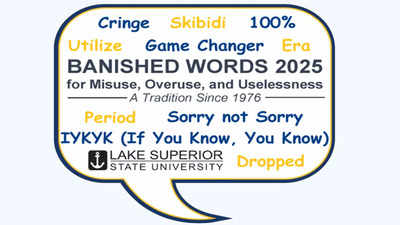
Lake Superior State University (LSSU), a US university known for its quirky and playful traditions, has revealed the 2025 edition of its Banished Words List, offering a lighthearted yet insightful look at language usage. For nearly five decades, the university has compiled an annual list of overused, misused, or generally annoying words and phrases that have overstayed their welcome in everyday conversation. The tradition, which dates back to 1976, aims to highlight how words and expressions evolve (and sometimes devolve) in modern communication.
This year’s list includes a mix of internet slang, corporate jargon, and pop culture terms that have worn out their welcome. LSSU received submissions from around the globe, including Canada, Australia, Germany, India, South Africa, and the US, underscoring the widespread frustration with certain expressions. Let’s take a closer look at the words and phrases that have made the cut in 2025:
Cringe
Once a term that captured discomfort or second-hand embarrassment, “cringe” has lost its impact due to overuse. Now, it’s almost ironic to hear someone say something is “so cringe,” as the word has become a punchline in itself. Ash from Newton, Alabama, puts it simply: “Hearing someone say ‘someone is so cringe’ makes me cringe!”
Game Changer
What happens when every innovation is labeled a “game changer”? The term becomes meaningless. The phrase has been used excessively to describe anything remotely new, and Patrick from Washington, DC, sums it up well: “Nothing is a game changer if everything is a game changer.”
Era
Thanks to pop culture icons like Taylor Swift, the term “era” has entered the mainstream, but its overuse has left it feeling hollow. Whether it’s someone’s “fatherhood era” or “pottery-making era,” the term now feels overblown, according to Leah from Holland, Michigan.
Dropped
Once trendy, “dropped” is now considered flat and uninspired, particularly when used to describe releases like albums or products. Susan from Littleton, CO, voices the frustration: “Books, music, and all kinds of unnecessary things are currently being ‘dropped’ rather than introduced or released.”
IYKYK (If You Know, You Know)
This internet slang phrase is cryptic and exclusionary, often leaving people feeling left out. Amy from Redford, MI, calls it both “irritating and nonsensical,” as it adds little value to a conversation.
Sorry Not Sorry
A phrase that offers a false sense of honesty, “Sorry Not Sorry” has become a way to dismiss true apologies. Sabrina from Wrenshall, MN, believes it’s “giving people another reason to be jerks to one another.”
Skibidi
Originating from viral internet content, the term “Skibidi” is an example of a once-popular phrase that has now lost its meaning, causing confusion and annoyance. Agatha from Denmark notes, “Nobody cares about a Skibidi toilet, Skibidi fizz, or Skibidi Ohio fanum tax.”
100%
A term meant to convey full agreement has become a linguistic cliché. Overused to an extreme degree, it now lacks nuance, as Stephen from Sudbury, Ontario, points out: “Since when should a percentage be used to describe your agreement in a conversation?”
Utilize
Long considered a more formal alternative to “use,” “utilize” has been criticized for its unnecessary complexity. Everett from Cumby, Texas, encourages simple writing: “Write like you talk, and Lord, I hope you don’t talk like that.”
Period
When someone adds “period” at the end of a statement to emphasize their point, it can feel like overkill. Theresa from Detroit, MI, suggests we “put it in a bottle and send it out to sea.”
The Banished Words List, a tradition for 49 years, encourages reflection on how language shapes communication. As always, the goal is not to stifle creativity but to remind us to be mindful of overused expressions that detract from meaningful conversation. The list continues to evolve, reflecting shifts in culture, technology, and language, while also offering a chance for humor and introspection.
To learn more about the tradition or to nominate a word for the 2026 list, visit the official LSSU Banished Words page.

